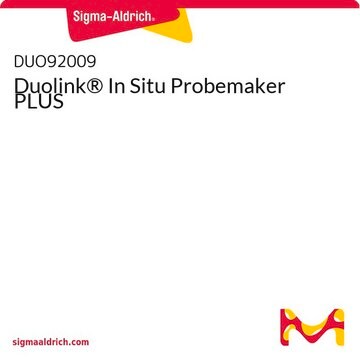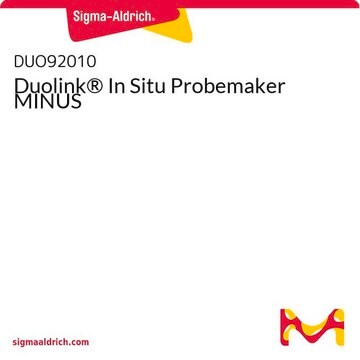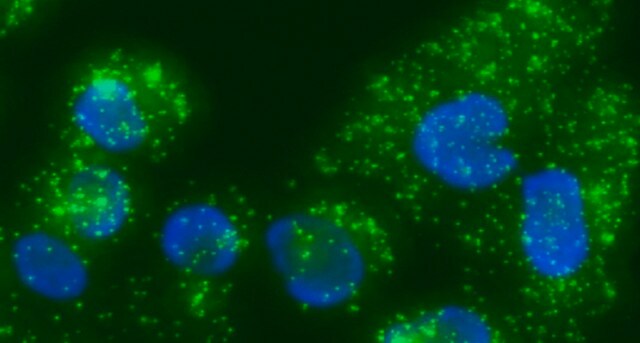DUO96010
Duolink® PLA Multicolor Probemaker Kit - Red
Proximity Ligation Assay Multiplexing: protein-protein interaction, post-translational modification and low abundant protein events
Synonym(s):
in situ Proximity Ligation Assay Kit, Protein Protein Interaction Kit
About This Item
Recommended Products
product line
Duolink®
technique(s)
immunofluorescence: suitable
multiplexing: suitable
proximity ligation assay: suitable
fluorescence
λex 594 nm; λem 624 nm (Texas Red®)
λex 594 nm; λem 624 nm (red)
suitability
suitable for fluorescence
shipped in
dry ice
storage temp.
−20°C
Application
Red fluorescence detection reagents are often used with Texas Red® filter.
Application Note
Primary antibodies are needed. Test your primary antibodies (IgG-class, mono- or polyclonal) in a standard immunofluorescence (IF), immunohistochemistry (IHC), or immunocytochemistry (ICC) assay to determine the optimal fixation, blocking, and titer conditions. Duolink® in situ reagents are suitable for use on fixed cells, cytospin cells, cells grown on slide, formalin-fixed, paraffin embedded (FFPE), or tissue (fresh or frozen). No minimum number of cells are required.
Let us do the work for you, learn more about our Custom Service Program to accelerate your Duolink® projects
View full Duolink® product list
Features and Benefits
- Visualize and detect multiple proteins events in one experiment.
- No overexpression or genetic manipulation required
- High specificity (fewer false positives)
- Detection of low abundant proteins due to rolling circle amplification
- Relative quantification possible
- No special equipment needed
- Faster and more simple than FRET
- Increased accuracy compared to co-IP
- Publication-ready results
Components
Duolink® PLA Multicolor Probemaker Kit - Red contains all the necessary reagents to perform the conjugations of Red Oligo A and Red Oligo B directly to primary antibodies. The resulting PLA probes (Red A and Red B) must be used together and cannot be paired with any other Duolink
This product is comprised of the following:
- Red Oligo A DUO86010A
- Red Oligo B DUO86010B
- Conjugation Buffer DUO82033
- Stop Reagent DUO82034
- Storage Solution DUO82035
See datasheet for more information.
To perform a Multicolor Duolink® PLA experiment primary antibodies (PLA, IHC, ICC or IF validated) that recognize protein targets of interest are required. Duolink® PLA Multicolor Probemaker-generated probes (Red A/Red B, Green C/Green D, Orange F/Orange G, and/or FarRed H/FarRed I) are used in combination to perform the Multiplex experiment.The reagents in the Duolink® PLA Multicolor Reagent Pack are required to perform the amplification and detection of the resulting PLA probes. Required additional reagents include Duolink® Wash Buffers and Mounting Medium.
Legal Information
Signal Word
Warning
Hazard Statements
Precautionary Statements
Hazard Classifications
Aquatic Chronic 2 - Skin Sens. 1
Storage Class Code
10 - Combustible liquids
WGK
WGK 3
Certificates of Analysis (COA)
Search for Certificates of Analysis (COA) by entering the products Lot/Batch Number. Lot and Batch Numbers can be found on a product’s label following the words ‘Lot’ or ‘Batch’.
Already Own This Product?
Find documentation for the products that you have recently purchased in the Document Library.
Customers Also Viewed
Our team of scientists has experience in all areas of research including Life Science, Material Science, Chemical Synthesis, Chromatography, Analytical and many others.
Contact Technical Service














